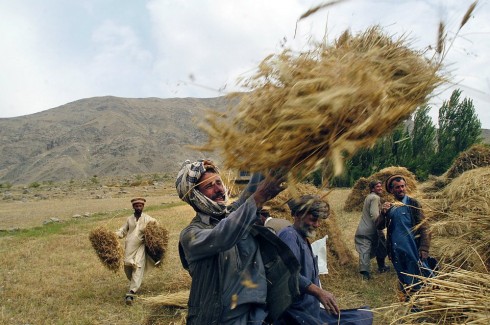“Our food systems create sick people” – UN rights expert
“Our food systems create sick people” – UN rights expert
Do you agree? Like and share
Five ways to tackle the public health disaster of bad diets– UN expert on the right to food
GENEVA (6 March 2012) – “Our food systems create sick people,” warned today United Nations Special Rapporteur on the right to food, Olivier De Schutter. “One in seven people globally are undernourished, but many more suffer from the ‚hidden hunger‘ of micronutrient deficiency, while 1.3 billion are overweight or obese.”
“Faced with this nutritional crisis, we need to tackle the systemic problems which generate poor nutrition,” the independent expert said as he presented his report* on the agriculture-food-health nexus to the UN Human Rights Council. “However, we continue to prescribe remedies like a doctor: nutrition pills and early-life nutrition strategies for those lacking in calories; slimming pills, lifestyle advice and calorie counting for the overweight.”
In his report, Mr. De Schutter identifies five priority actions for putting nutrition at the heart of food systems in the developed and developing world:
- taxing unhealthy products;
- regulating foods high in saturated fats, salt and sugar;
- cracking down on junk food advertising;
- overhauling wrong-headed agricultural subsidies which make certain ingredients cheaper than others;
- and supporting local food production so that consumers have access to healthy, fresh and nutritious foods.
“Urbanization, supermarketization and the global spread of Western lifestyles have shaken up traditional food habits. The result is a public health disaster,” the Special Rapporteur said. “Governments have been focusing on increasing calorie availability, but they have often been indifferent to what kind of calories are on offer, at what price, to whom they are accessible, and how they are marketed.”
“We have deferred to food companies the responsibility for ensuring that a good nutritional balance emerges. Voluntary guidelines and piecemeal nutrition initiatives have failed to create a system with the right signals, and the odds remain stacked against the achievement of a healthy, balanced diet,” he said.
“The right to food means not only access to an adequate quantity of food, but also the ability to have a balanced and nutritious diet,” Mr. De Schutter noted. “Governments must not abstain from the responsibility to secure this right.”
The Special Rapporteur also identified the abundance of processed food as a major threat to improving nutrition. “Heavy processing thrives in our global food system, and is a win-win for multinational agri-food companies. Processed items can be produced and distributed on a huge scale, thanks to cheap subsidized ingredients and their increased shelf life.”
“But for the people, it is a lose-lose,” he stressed. “Heavily processed foods lead to diets richer in saturated and trans-fatty acids, salt, and sugars. Children become hooked on the junk foods targeted at them. In better-off countries, the poorest population groups are most affected, because foods high in fats, sugar and salt are often cheaper than healthy diets, as a result of wrong-headed subsidies whose health impacts have been wholly ignored.”
The UN expert noted that the West is now exporting diabetes and heart disease in developing countries, along with the processed foods which line the shelves of global supermarkets. By 2030, more than 5 million people will die each year before the age of 60 from non-communicable diseases linked to diets.
“We should not simply invest our hopes in medicalizing our diets with enriched products, or changing people’s choices through health warnings. Ambitious, targeted nutrition strategies can work, but only if the food systems underpinning them are put right,” the Special Rapporteur said.
Olivier De Schutter was appointed the Special Rapporteur on the right to food in May 2008 by the UN Human Rights Council. He is independent from any government or organization.
http://www.ohchr.org/Documents/HRBodies/HRCouncil/RegularSession/Session19/A-HRC-19-59_en.pdf
For the full briefing note entitled The World Trade Organization and the Post-Global Food Crisis Agenda: Putting Food Security First in the International Food System, visit: http://www.ohchr.org/Documents/Issues/Food/BN4_SRRTF_WTO_EN.pdf or http://www.srfood.org/images/stories/pdf/otherdocuments/20111116_briefing_note_05_en.pdf
For more information on the mandate and work of the Special Rapporteur, visit: http://www2.ohchr.org/english/issues/food/index.htm or www.srfood.org
Press contacts:
Yoonie Kim or Ulrik Halsteen (OHCHR): +41 22 917 9643 / 9323 / srfood@ohchr.org
UN Human Rights, follow us on social media:
Facebook: https://www.facebook.com/unitednationshumanrights
Twitter: http://twitter.com/UNrightswire
YouTube: http://www.youtube.com/UNOHCHR
Check the Universal Human Rights Index: http://uhri.ohchr.org/en
http://www.facebook.com/ANHInternational
http://www.facebook.com/organicconsumers
http://www.facebook.com/FoodandWaterWatch US , http://foodwatch.de/
http://bikyamasr.com/60747/un-expert-calls-for-junk-food-tax
http://www.foodsovereignty.org http://www.foodsov.org
http://en.wikipedia.org/wiki/Fat_tax
http://en.wikipedia.org/wiki/Right_to_food
http://en.wikipedia.org/wiki/Food_security
http://en.wikipedia.org/wiki/Agricultural_subsidy
Who Will be The Biggest Farm Bill Loser?
Fordern Sie sichere Grenzwerte für Uran im Wasser!

Seit dem 1. November 2011 gilt endlich ein Grenzwert für Uran im Trinkwasser. Versprochen hatte ihn die Regierung bereits im Sommer 2008, nachdem foodwatch erstmals Tausende von Messdaten mit teils hoher Belastung veröffentlicht hatte. Nur: Die gesetzliche Höchstgrenze ist so hoch angesetzt, dass Säuglinge und Kleinkinder nicht ausreichend geschützt werden. Für Mineralwasser gibt es zudem immer noch kein Uran-Limit. Helfen Sie uns, weiter Druck zu machen: Fordern Sie sichere Höchstwerte, die auch kleine Kinder schützen, bei Trink- wie auch bei Mineralwasser!
https://foodwatch.de/kampagnen__themen/mineralwasser/mitmach_aktion/index_ger.html
http://en.wikipedia.org/wiki/Right_to_water This article is about a right to water as a human right under international law. For a discussion of water usage laws in common law, see Water right.
See also: http://fukushima-diary.com/
http://www.gmcontaminationregister.org/ http://www.gmwatch.org/
http://foodfreedom.wordpress.com/2012/03/03/2012-farm-bill-subsidizes-factory-farms
Comments are closed.
